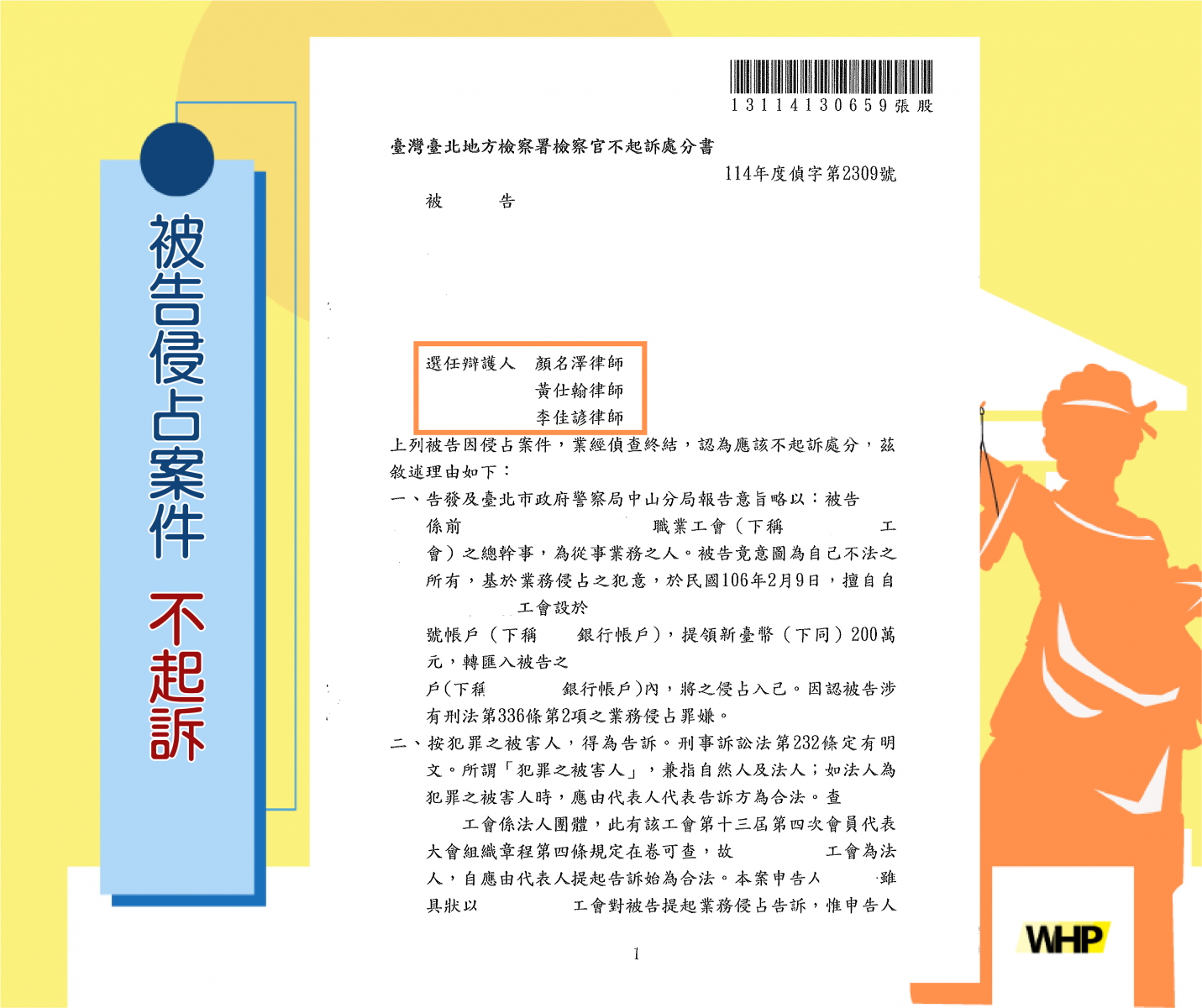首頁 >
| Criminal | Defendant Charged with Embezzlement in Business Obtained a Non-Prosecution Disposition

Relevant Legal Provisions
Article 336, Paragraph 2 of the Criminal Code:Whoever commits the crime under Paragraph 1 of the preceding article with respect to property held in the course of business shall be sentenced to imprisonment for not less than six months but not more than five years, and may also be fined up to ninety thousand New Taiwan Dollars.
Facts and Reasons
Several years ago, the complainant, serving as the chairman of a labor union, faced unstable income of the union, which made it impossible to pay members' labor and health insurance premiums. The complainant then borrowed money from the defendant. Because of their established personal relationship and mutual trust, the defendant lent several hundred thousand dollars to the union. Later, the also repaid part of the loan. Unexpectedly, years later, due to the deterioration of the relationship between the complainant and the defendant, and the appearance of discrepancies in the union's accounts, the complainant accused the defendant of embezzling funds, denied ever having borrowed money from the defendant, and instead alleged that the defendant had used the union's seal without authorization. Feeling deeply wronged, the defendant sought assistance from our firm.
Prosecutor's Disposition
With respect to the above-mentioned embezzlement case, after the investigation was concluded, the Prosecutor's Office determined that a non-prosecution disposition was appropriate.
According to the testimony of the accountant, the union's official seal and passbook were kept by the accountant, while the smaller seal was kept by the chairman (i.e., the complainant). The chairman would not have handed the smaller seal to the defendant for use. The accountant further confirmed that there was indeed a loan transaction at the time. In addition, the transfer vouchers bore the stamps and approvals of the then-chairman (the complainant), the standing supervisor, and the accountant. Under common sense, how could the complainant have been completely unaware of the matter? Whether the complainant's allegations were true was clearly doubtful. At that time, the complainant was the chairman; if the defendant could have freely used the union's funds without the chairman's knowledge, it would be implausible to the general public. Therefore, it was impossible to convict the defendant solely based on the complainant's unsubstantiated claims.
(Some details of the case have been adjusted or omitted to protect the parties' rights.)
Attorneys: Vincent Huang、Ian Yan、Ian Lee
-
11.25 2025
Criminal | Forgery of Documents, etc. Successfully...
-
11.18 2025
Civil Case | Defendant’s Claim for Damages Success...
-
11.11 2025
Criminal | Violation of Anti-Money Laundering Act,...
-
10.28 2025
Criminal Case | Defendant Acquitted of Hit-and-Run...
-
10.21 2025
Criminal Case | Defendant Charged with Forgery Acq...
-
10.14 2025
Assisted in the Division of Co-owned Property and ...
-
09.30 2025
Defendant – Offenses Against Sexual Autonomy Appea...
-
09.23 2025
Criminal | Defendant Charged with Embezzlement in ...
-
09.16 2025
Criminal | Case of Infringement of Sexual Privacy ...
-
09.09 2025
Request for Ownership Transfer Registration – Plai...
-
09.02 2025
Civil | Joint Construction Dispute Requesting Perf...
-
08.26 2025
Criminal | Defendant Charged with Aggravated Fraud...
-
08.19 2025
Internal Company Dispute Defendant Forged Document...
-
08.12 2025
Civil Case | Check Dishonored – Claim for Loan Rep...
-
08.05 2025
Heavy Motorcycle Rear-End Collision, Lawsuit for N...